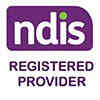ULTIMATE ACTIVEWEAR
Empowering Mobility Summit: The Art and Science of Power Wheelchair Prescription (Melbourne)
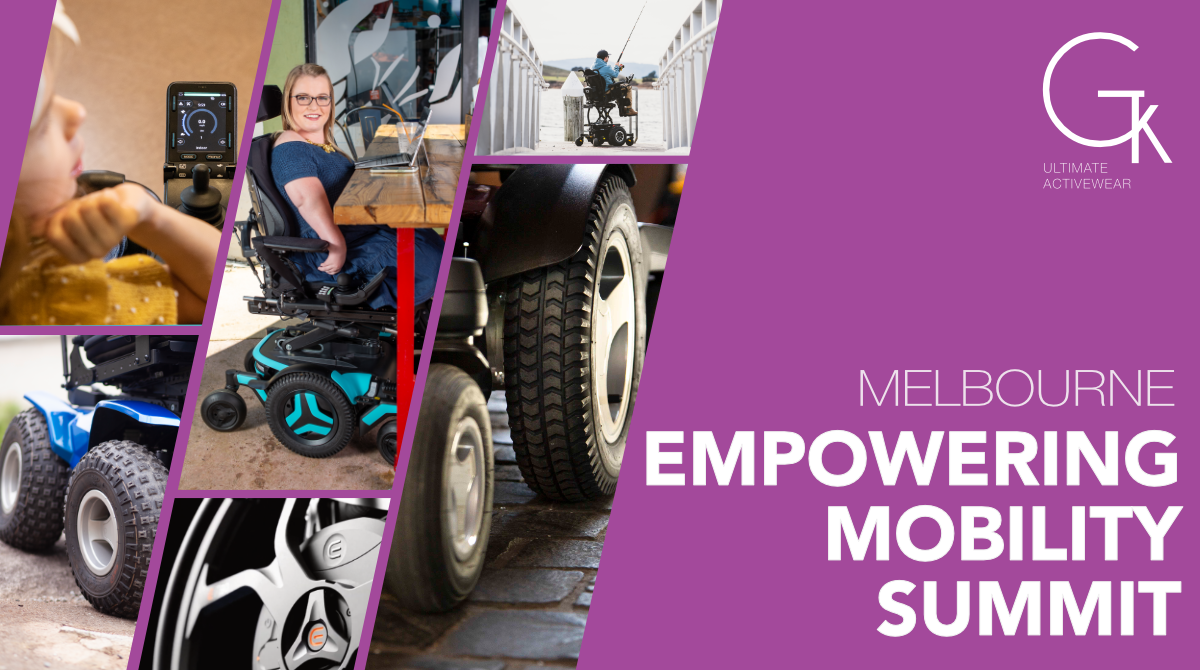
Empower Mobility Summit: A Clinician Education Day
Join us for a dynamic summit tailored to meet the needs of both newer and experienced prescribers of powered mobility. We’re bringing together leading presenters from across the industry to share current developments and the wealth of their experience. This summit is a must-attend for clinicians prescribing power wheelchairs, with topics including the assessment process, power seat functions, power assist devices, access and control methods, power wheelchair programming, and how to use tools and make adjustments to power wheelchairs.
Don’t miss this chance to hear from our lineup of industry experts who will share their insights and experiences, tips for powered mobility assessment and prescription, and strategies to identify individualised solutions. You’ll have the opportunity to engage with renowned specialists, gain hands-on experience with state-of-the-art power wheelchairs, and network with like-minded professionals.
With two specialised streams, there’s something for everyone looking to deepen their expertise in powered wheelchair prescription. Whether you’re an experienced therapist or new to the field, this summit will empower you to provide the best possible solutions for your clients.
When:
Where:
Cost:
Wednesday 5th February 2025
8.30am – 4.30pm
$80
Morning tea, lunch and afternoon tea will be provided.
Stream 1 : For newer prescribers
8.30am – 9am : Registration and welcome
9am: Starting the Powered Mobility Journey
As a clinician new to the world of prescribing powered wheelchairs, it can be challenging to find your footing. In this workshop, we’ll explore best practice for powered mobility device prescription, including domains of assessment to be addressed and the theoretical framework supporting powered mobility prescription. We’ll discuss the development of functional and community engagement goals while keeping safety at the forefront.
We’ll look at outcome measures to support clinical reasoning for funding applications and ensuring optimal outcomes for participants during prescription, provision and ongoing use of the powered wheelchair. Furthermore, we’ll explore guiding users in mastering the control of a power wheelchair, enhancing their independence at home, during transportation, and within the community.
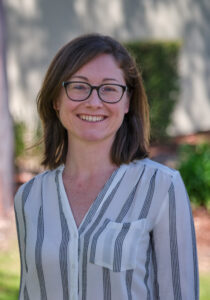 Kate comes from an occupational therapy background, with two decades of experience in varied settings, specialising in wheelchair seating and positioning. She has followed the evolution of wheelchair seating theory and practice, and enjoys bringing the latest research to therapists practicing in the field.
Kate comes from an occupational therapy background, with two decades of experience in varied settings, specialising in wheelchair seating and positioning. She has followed the evolution of wheelchair seating theory and practice, and enjoys bringing the latest research to therapists practicing in the field.
Kate is also an enthusiastic proponent of posture care over the 24 hour time period, through the lifespan, sharing the appreciation that positioning outside of the wheelchair is just as important as postural alignment in mobility devices.
Kate is passionate about sharing her skills and experiences with therapists, to build their confidence in postural assessment and prescription of wheelchairs and seating. Kate enjoys presenting at larger clinical education events and inservices for therapy groups, as well as supporting therapists with complex postural assessments and equipment prescription10.45am: Clinical Reasoning: Power vs Power Assist
Power assist systems have rapidly evolved in recent years. They are commonly considered as an alternative to a power wheelchair. This workshop will focus on clinical implications and decision process when deciding between power and power assist technology. We’ll look the indications for these technologies and objective measures useful to qualify the technology for your client. We’ll also discuss training strategies to maximise functional gains.
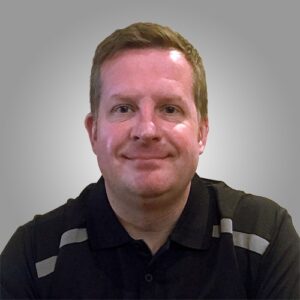
Originally from the UK and with a background of Prosthetics and Rehabilitation Engineering Scott brings with him over 30 years of knowledge working in these respective fields. Trained in the UK with the NHS as a Rehabilitation Engineer from 2003, Scott has experience in the management of various client populations regarding the provision of appropriate seating, mobility and pressure reducing equipment.
In 2008, Scott moved to Australia where he has worked with various equipment suppliers helping to support clients, carers and therapists bring a holistic approach to the provision of assistive technology.
Scott is the Client Sales Manager at Magic Mobility and has a passion for the assessment / management of clients with complex seating and mobility needs helping to improve client’s lives, ensuring equipment issued has a positive outcome to enable clients meet their goals and aspirations in a world that’s not flat.
1pm: Empowering Mobility: A Guide to Selecting the Ideal Power Wheelchair Base
 Andrew Lopez – Product Specialist & Clinical Educator (BOccThy)
Andrew Lopez – Product Specialist & Clinical Educator (BOccThy)
Andrew Lopez is a highly skilled Occupational Therapist specialising in Complex Seating and Wheelchair Prescription. He earned his Bachelor of Health Science and Master of Occupational Therapy degree from Western Sydney University. Over the last five years, Andrew has established himself as a leading Assistive Technology specialist, with a strong emphasis on optimizing seating and mobility outcomes. His unwavering dedication to his profession is exemplified through his passion for enhancing the independence of wheelchair users and his commitment to client and family-centric objectives. Andrew’s recent career advancement has led him to join Quantum Australia as a Product Specialist and Clinical Educator for NSW, where he can share his passion in educating others in the realm of wheelchairs and seating.
2.45pm: Putting the ‘Function’ in Power Seat Functions
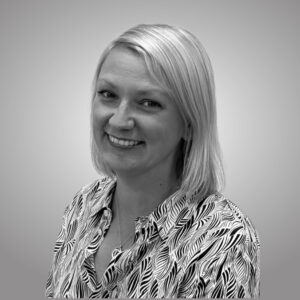 Tilly Brook graduated from the University of Adelaide in 2008 with a Bachelor of Health Science followed by a Masters of Occupational Therapy (Hons) in 2010 from the University of Sydney.
Tilly Brook graduated from the University of Adelaide in 2008 with a Bachelor of Health Science followed by a Masters of Occupational Therapy (Hons) in 2010 from the University of Sydney.
Tilly worked within rehabilitation, working primarily with adults with a brain injury until 2015 when she moved to Singapore. In Singapore, she worked with children and adults at the Cerebral Palsy Alliance School (CPAS). In 2017 Tilly’s clinical knowledge continued as she worked with Mobility Solutions in Auckland, New Zealand. On her return to Australia, Tilly assisted in the development of the Clinical Hub Team at Sunrise Medical where her passion and experience for mentoring and educating therapists grew. Tilly Joined Permobil in January 2022 and is driven to grow therapists, enabling them to be the best therapist they can be.
Stream 2 : For experienced prescribers
8.30am – 9am : Registration and welcome
9am: The Ins and Outs and How to Make a Real Difference to a User’s Function and Mobility through Functional Programming
The programming possibilities of Power Wheelchairs have and continues to evolve – from handheld programmers through to computers, on board programming and now through your phone. The evolution and innovation of technology used in Power Wheelchairs has one focus: to ensure the Power Wheelchair provides the best outcome for the user. As much of this technology is often out of sight, at times it can be out of mind, which can lead to reduced functional outcomes and limit a user’s independence.
In this workshop, you will be provided with the opportunity to get up close and personal with Power Wheelchairs, specifically the programming. We will discuss common (and not so common) difficulties which wheelchair users report when using their Power Wheelchair – and what specific programming changes enable an increase in function and participation. We will provide the links between functional goals and programming outcomes, and how optimal programming can assist users to overcome barriers.
 Tilly Brook graduated from the University of Adelaide in 2008 with a Bachelor of Health Science followed by a Masters of Occupational Therapy (Hons) in 2010 from the University of Sydney.
Tilly Brook graduated from the University of Adelaide in 2008 with a Bachelor of Health Science followed by a Masters of Occupational Therapy (Hons) in 2010 from the University of Sydney.
Tilly worked within rehabilitation, working primarily with adults with a brain injury until 2015 when she moved to Singapore. In Singapore, she worked with children and adults at the Cerebral Palsy Alliance School (CPAS). In 2017 Tilly’s clinical knowledge continued as she worked with Mobility Solutions in Auckland, New Zealand. On her return to Australia, Tilly assisted in the development of the Clinical Hub Team at Sunrise Medical where her passion and experience for mentoring and educating therapists grew. Tilly Joined Permobil in January 2022 and is driven to grow therapists, enabling them to be the best therapist they can be.
10.45am: Alternate Controls – An ‘Alternate’ Route to Independence
In this session, we’ll be delving into the world of alternate controls for power wheelchairs, focusing on enhancing users’ independence and mobility. We’ll introduce the 2 main types of alternate controls, including Proportional Controls and Switch Controls, and explore how these can be tailored to individual needs. Beyond the basics, we’ll delve into some innovative solutions, such as head arrays, chin control, and direction switch inputs. By the end of the session, participants will gain a deeper understanding of the intricacies involved in assessing and selecting the most suitable control system for their clients.
 Andrew Lopez – Product Specialist & Clinical Educator (BOccThy)
Andrew Lopez – Product Specialist & Clinical Educator (BOccThy)
Andrew Lopez is a highly skilled Occupational Therapist specialising in Complex Seating and Wheelchair Prescription. He earned his Bachelor of Health Science and Master of Occupational Therapy degree from Western Sydney University. Over the last five years, Andrew has established himself as a leading Assistive Technology specialist, with a strong emphasis on optimizing seating and mobility outcomes. His unwavering dedication to his profession is exemplified through his passion for enhancing the independence of wheelchair users and his commitment to client and family-centric objectives. Andrew’s recent career advancement has led him to join Quantum Australia as a Product Specialist and Clinical Educator for NSW, where he can share his passion in educating others in the realm of wheelchairs and seating.
1pm: Escaping the Footpath: Unlocking New Horizons (Off-Road Power Mobility)
Prescribing a powerchair often poses many challenges as you consider factors that affect client function and wheelchair performance outside the 4 walls of a clients home. We’ll help you understand the different base types and how they impact on client participation and functional outcomes.
We’ll consider:
- Selecting a suitable base to cover personal and environmental needs
- Funding considerations – what features are necessary rather than desirable

Originally from the UK and with a background of Prosthetics and Rehabilitation Engineering Scott brings with him over 30 years of knowledge working in these respective fields. Trained in the UK with the NHS as a Rehabilitation Engineer from 2003, Scott has experience in the management of various client populations regarding the provision of appropriate seating, mobility and pressure reducing equipment.
In 2008, Scott moved to Australia where he has worked with various equipment suppliers helping to support clients, carers and therapists bring a holistic approach to the provision of assistive technology.
Scott is the Client Sales Manager at Magic Mobility and has a passion for the assessment / management of clients with complex seating and mobility needs helping to improve client’s lives, ensuring equipment issued has a positive outcome to enable clients meet their goals and aspirations in a world that’s not flat.
2.45pm: Fine-Tuning for Function: Making Adjustments to Powered Wheelchairs
Small adjustments can make a big difference in a powered wheelchair user’s comfort, function, and overall mobility. But knowing when to make those adjustments—and when to call in a technician or Assistive Technology Consultant—is crucial for ensuring safety and optimal performance. This workshop is designed to help therapists build the skills and confidence needed to enhance user independence through fine-tuning powered wheelchair set-up.
You’ll learn to identify when adjustments are safe to perform as a therapist and when more complex changes require specialized expertise. Through hands-on, practical learning, participants will learn which tools to use and gain experience in making common adjustments to wheelchair and seating components to achieve optimal outcomes for participants.
 Kate comes from an occupational therapy background, with two decades of experience in varied settings, specialising in wheelchair seating and positioning. She has followed the evolution of wheelchair seating theory and practice, and enjoys bringing the latest research to therapists practicing in the field.
Kate comes from an occupational therapy background, with two decades of experience in varied settings, specialising in wheelchair seating and positioning. She has followed the evolution of wheelchair seating theory and practice, and enjoys bringing the latest research to therapists practicing in the field.
Kate is also an enthusiastic proponent of posture care over the 24 hour time period, through the lifespan, sharing the appreciation that positioning outside of the wheelchair is just as important as postural alignment in mobility devices.
Kate is passionate about sharing her skills and experiences with therapists, to build their confidence in postural assessment and prescription of wheelchairs and seating. Kate enjoys presenting at larger clinical education events and inservices for therapy groups, as well as supporting therapists with complex postural assessments and equipment prescription
We appreciate your interest in our workshop and the desire to get the most out of your experience. However, we’ve designed this workshop with two distinct streams to cater to different levels of expertise and learning needs. The streams have been carefully curated to ensure that attendees receive content and insights that are relevant to their specific skill level and experience.
Stream 1 – Newcomers: This stream is tailored for those who are newer to the field. It covers foundational concepts, best practices, and provides a great opportunity for beginners to gain a solid understanding of the subject matter. If you’re relatively new to the field, this stream is the perfect choice for you to build a strong knowledge base.
Stream 2 – Experienced Practitioners: For those who have already accumulated a substantial amount of experience in the field, this stream offers advanced insights, case studies, and discussions that delve deep into complex topics. It’s ideal for practitioners looking to expand their knowledge and network with experts in the field.
To ensure a valuable and focused learning experience for all attendees, we kindly request that you choose one stream that aligns with your current skill level and objectives. Each stream has been structured to provide the most relevant and beneficial content for its respective audience. Mixing and matching between the streams might result in a less optimised experience, as the content is intentionally tailored to address specific needs.
If you find that your needs span across both streams or if you’re unsure which stream is the best fit for you, we recommend assessing your goals and current expertise level to make the most informed decision. Feel free to reach out to us if you have any questions or need assistance in determining the most suitable stream for your workshop experience. We want to ensure that your time at the workshop is both enriching and valuable for your professional development.

